
Bridging the Gap in Translational Regenerative Medicine: From Genomic Inclusion and iPSC Innovation to Clinical Testing
Local time (Corresponding local time at your current location)
Overview
Dr. Scholefield will discuss the importance of embedding African genetic diversity into global research pipelines. Africa encompasses more genetic variation than the rest of the world yet this rich diversity is critically under-represented in medical research and treatments, not the least of which is due to dearth of cellular tools and medicines generated on the African continent. Consequently, medicines developed in the Global North often lead to sub-optimal treatment outcome, where nearly 10% of South African hospitalizations are caused by adverse drug reactions. With the alignment of mutually beneficial collaborations, North – South partnerships can ensure that access to Africa’s vast genetic heritage is positively embedded in global R&D pipelines.
Dr. Deng will discuss his journey from chemically-induced stem cell-derived islets (CiPSC) line generation to clinical testing of CiPSC-derived islets through transplantation for Regenerative Medicine. In 2022, his team demonstrated that small molecules can effectively reprogram human somatic cells to pluripotent stem cells. Their chemical approach provides a new platform for the generation and application of human pluripotent stem cells in biomedicine. Most recently, chemically-induced stem cell-derived islets (CiPSC-islets) were transplanted underneath the abdominal anterior rectus sheath of a patient, resulting in rapid reversal of diabetes. The results from the first patient suggest feasibility of this treatment modality and warrant its further exploration.
Learning Objectives
- Highlight the critical need for incorporating African genetic diversity into global biomedical research and its impact on treatment outcomes.
- Explore strategies for fostering equitable North–South collaborations in genomic science and drug development.
- Understand the development and clinical potential of chemically-induced pluripotent stem cells (CiPSCs) for regenerative medicine.
- Examine the translational journey from in vitro CiPSC-based platforms to successful clinical application through islet transplantation.
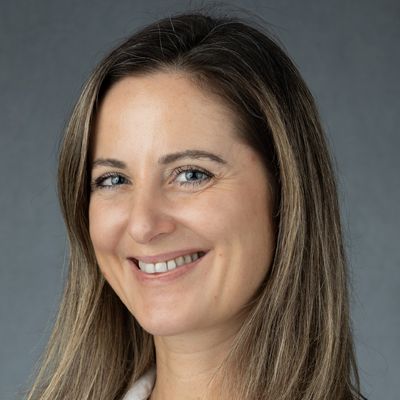
Moderator
Bio
Miami Engineering Career Development Associate Professor
Department of Biomedical Engineering
University of Miami, USA
Dr. Tomei is the Miami Engineering Career Development Associate Professor in Biomedical Engineering at the University of Miami. She obtained her M.S. in Materials Engineering from the Politecnico of Milan (Italy) in 2004, and her Ph.D. in Bioengineering and Biotechnology from the Ecole Polytechnique Fédérale de Lausanne (EPFL, Switzerland) in 2008. Dr. Tomei currently directs the Islet Immunoengineering Lab at the Diabetes Research Institute (DRI) where she is applying her unique background in bioengineering and immunology to develop novel immunoengineering platforms to prevent rejection after islet transplantation and to promote antigen-specific tolerance for a cure of type-1 diabetes.
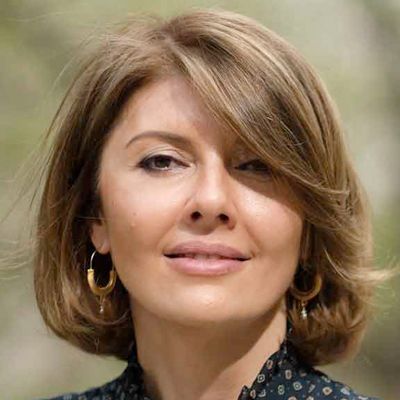
Moderator
Bio
Head of the Laboratory of Tissue Engineering and Organ Regeneration
University of Geneva
Technical Director of the Cell Isolation and Transplantation Center
University of Geneva Hospitals, Switzerland
Dr. Ekaterine Berishvili is the Technical Director at the Cell Isolation and Transplantation Center, Department of Surgery, University of Geneva Hospitals. She also leads the Laboratory of Tissue Engineering and Organ Regeneration at the University of Geneva. Her expertise is focused on cell-based therapies for type 1 diabetes, immune tolerance induction, and the bioengineering of the endocrine pancreas. She holds positions on the board of the ESOT and CTRMS. Dr. Berishvili is an active member of several scientific committees, including Breakthrough T1D beta cell replacement consortium, and serves on the editorial board of Transplant International as an associate editor. At the national level, Dr. Berishvili is a member of the Swiss Transplant Cohort Study’s scientific committee. She represents Geneva in the Swisstransplant working group specializing in pancreas, islet, and small bowel transplantation.
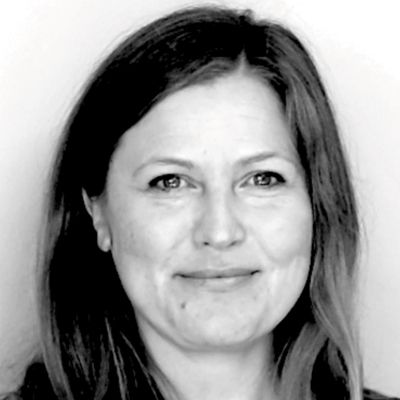
Speaker
Bio
Research Group Leader, Council for Scientific and Industrial Research (CSIR)
Honorary lecturer, Department of Human Biology, University of Cape Town
Department of Human Genetics, University of Witwatersrand
Pretoria, South Africa
After completing her PhD in Human Genetics at the University of Cape Town (UCT), Janine Scholefield spent three years as a Nufield Medical Fellow at the University of Oxford. Since returning to South Africa, she has specialized in cellular modelling of disease by establishing induced pluripotent stem cell research in the country. Her research focuses on developing physiologically relevant cellular models of disease using advanced technologies, including stem cells and genome engineering, especially within the unique context of the diverse sub-Saharan African genetic background.
She is a Research Group Leader at the Council for Scientific and Industrial Research and holds honorary lectureship positions in the Department of Human Biology at the University of Cape Town and in the Department of Human Genetics at the University of Witwatersrand. In addition, she is the Editor-in-Chief for the Springer Nature journal Gene Therapy.
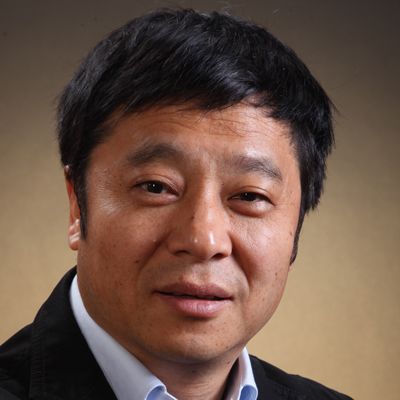
Speaker
Bio
Boya Chair Professor, Peking University
Director, Peking University Stem Cell Research Center
Beijing, China
Hongkui Deng is a Boya Chair Professor at Peking University, and the director of the Peking University Stem Cell Research Center. In 2013, his lab developed a chemical reprogramming strategy to induce pluripotent stem cells from somatic cell types using only small molecules. This breakthrough has opened new avenues for manipulating cellular identities via chemical reprogramming. He has also developed a state-of-the-art stem cell differentiation technology to generate insulin-producing cells. Coupled with a novel transplantation strategy, these technologies yield remarkable therapeutic efficacy in clinical studies.
Use the image below to promote this event (right-click to download)
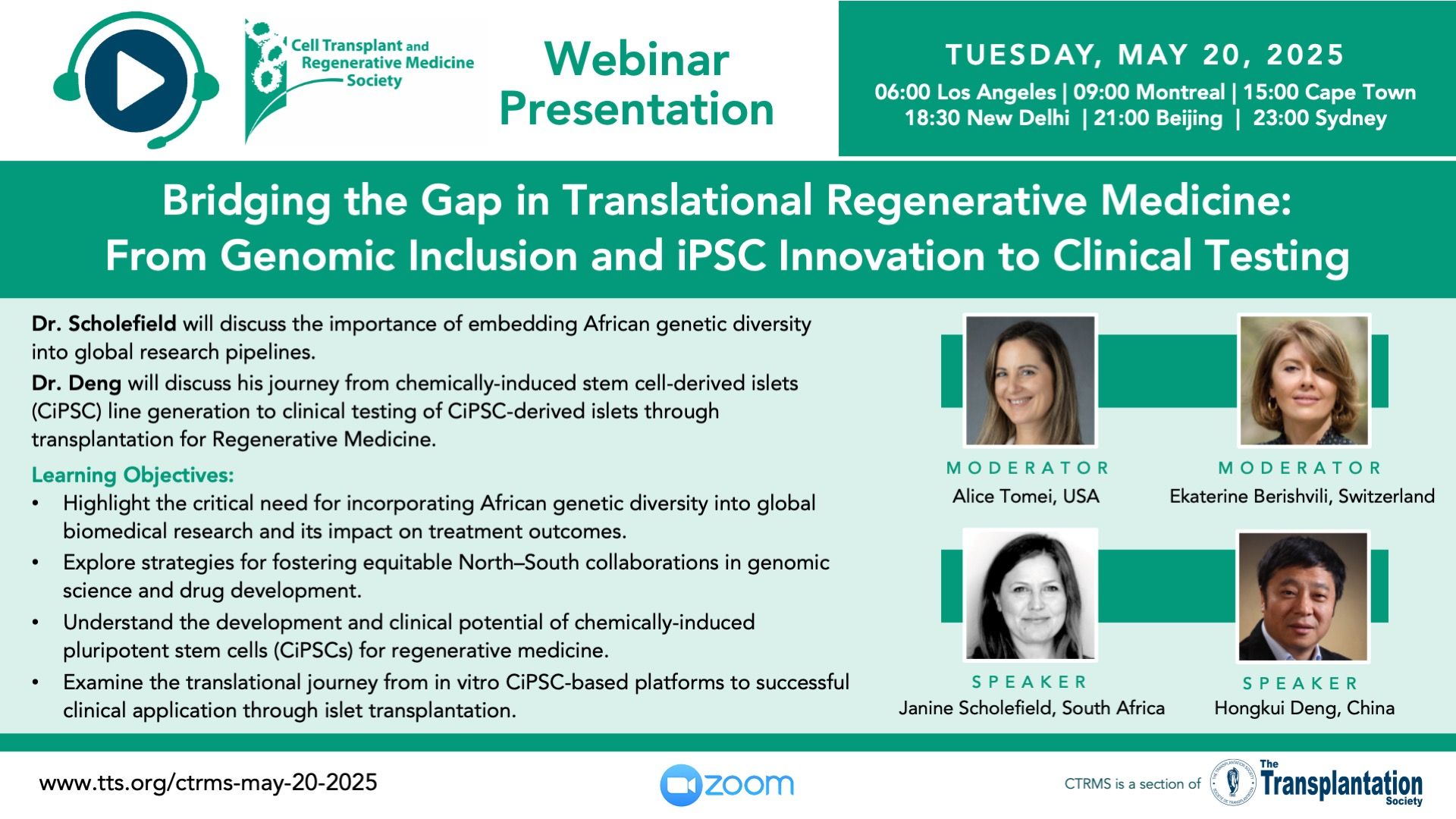
Contact
Address
The Transplantation Society
International Headquarters
740 Notre-Dame Ouest
Suite 1245
Montréal, QC, H3C 3X6
Canada
Используйте Вавада казино для игры с бонусом — активируйте промокод и начните выигрывать уже сегодня!
